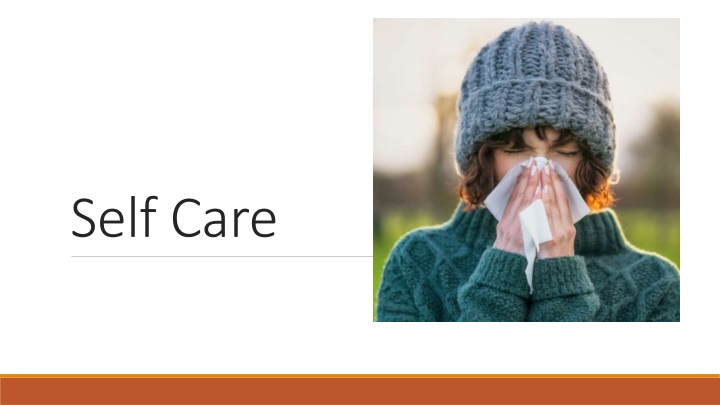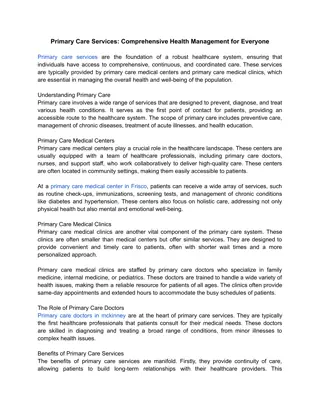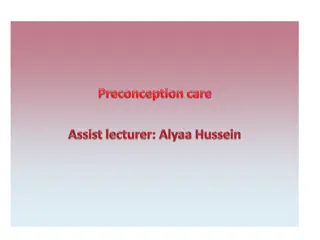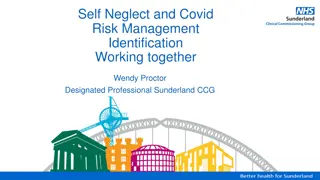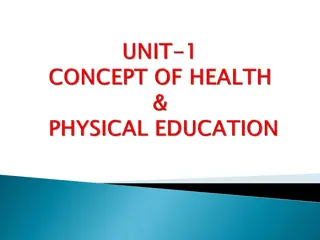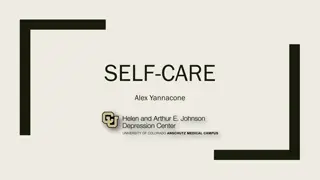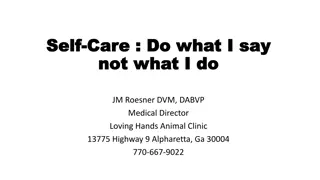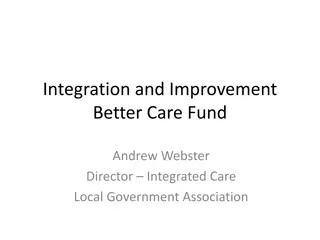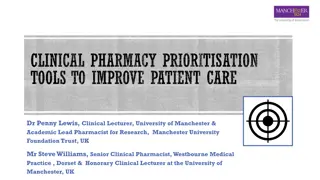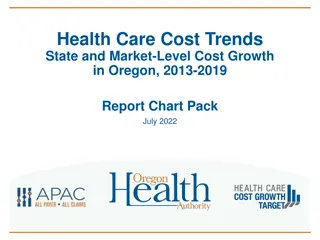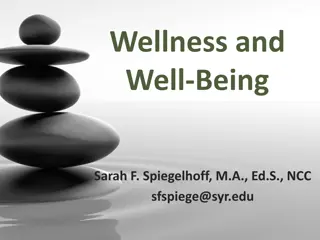Prioritising Self-Care for Better Health and Well-Being
Prioritising self-care is vital for managing our health effectively. It involves actions like staying active, eating well, and having essential medicines at home. By practicing self-care, we can alleviate pressure on healthcare services and prevent minor ailments from escalating. Pharmacies and online resources are available for non-urgent medical advice and support.
Download Presentation

Please find below an Image/Link to download the presentation.
The content on the website is provided AS IS for your information and personal use only. It may not be sold, licensed, or shared on other websites without obtaining consent from the author.If you encounter any issues during the download, it is possible that the publisher has removed the file from their server.
You are allowed to download the files provided on this website for personal or commercial use, subject to the condition that they are used lawfully. All files are the property of their respective owners.
The content on the website is provided AS IS for your information and personal use only. It may not be sold, licensed, or shared on other websites without obtaining consent from the author.
E N D
Presentation Transcript
Self Care Campaign We all need to prioritise self-care in our lives. Self-care refers to the actions we take to recognise, treat, and manage our own health. It can include keeping active, eating well, stopping smoking, and limiting alcohol to recommended levels. It s also a good idea to keep your medicine cabinet stocked with essential over-the- counter medicines for unexpected minor illnesses or discomfort, such as painkillers, cold and flu remedies, and oral re-hydration packets. Be careful not to use cough and cold remedies if you're taking paracetamol and ibuprofen tablets. These small, simple steps can make a significant difference to your overall health and happiness. Dr J Pepper Chair of Shropshire, Telford and Wrekin CCG
The First Step to Self Care In order to alleviate some of the pressure on NHS services we are all being encouraged to operate the self care method. Self care should be the first step to treating and managing common or minor ailments. With small lifestyle changes, a well stocked medicine cabinet and appropriate support we can help prevent further ill health without visiting your GP surgery or local A&E department.
Care at Home the medicine cabinet At the first sign of a common complaint or recurring minor ailment treatment should begin at home. Keep well stocked of; o paracetamol o ibuprofen o antihistamines o basic dressings and plasters o indigestion remedies o antiseptic cream o diarrhoea medication prevention and rehydration sachets o decongestants o thermometer o tweezers
Care at Home The Pharmacy Every year, millions of us visit our GP with minor health problems that our local pharmacist could resolve. All pharmacists can recognise many common health complaints. They can give advice or, where appropriate, medicines that will help to clear up the problem. If your problem is more serious and needs the attention of a GP, your pharmacist will recognise this and advise you to see your GP. What s more, many pharmacies are open in the evenings and at weekends.
Care at Home non-urgent advice If you need medical advice that is non-urgent the following options can be useful: Ask NHS 24/7 App - This allows you to access the same services as you can by telephone - just in a digital format. It includes a virtual clinician and symptom checker and helps you to access appropriate care. You can download the Ask NHS app via Google Play or Apple App Store. NHS 111 - Help and advice is available 24-hours-a-day (just dial 111) free of charge from a landline or mobile. Trained advisors can provide information and direct you to the best healthcare service for you. This is not to be used for a 999 emergency. Click here to find out more about 111. NHS website (formerly NHS Choices) - Help is at hand at the click of a button on a range of health conditions and treatments.
Urgent Care or Injuries For urgent problems, exacerbation of existing conditions that need immediate treatment or emergency advice you should visit the local minor injuries or A&E department. The A&E Department local to BMP is located within The County Hospital, Weston Road, Stafford and is open from 8am 10pm every day. In an emergency situation outside of County Hospitals hours you can attend: The Royal Stoke University Hospital, Newcastle Road, Stoke-on-Trent, ST4 6QG New Cross Hospital (Wolverhampton), Wednesfield Road, Wolverhampton, WV10 0QP Queens Hospital (Burton), Belvedere Road, Burton-upon-Trent, Staffordshire, DE13 0RB Manor Hospital (Walsall), Moat Road, Walsall, West Midlands, WS2 9PS
You and Your GP Surgery Helping you get the most out of the services your surgery offers it may be useful to consider the following points 1. How urgent is your issue? If your priority is to be seen quickly rather than wait for an appointment with a particular GP you will be offered alternative appointments with the most appropriate clinician. 2. Can it be sorted over the phone? If your problem can be resolved or acted on from a telephone call with a clinician, this could be the quickest and most effective way of interacting with the surgery.
3. Be prepared to attend when offered When asking for an appointment, you may be asked to come in at short notice if an appointment has become available. 4. Could another member of staff help you? The surgery offers appointments with the musculoskeletal practitioner, social prescriber, mental health nurse, pharmacists, nurses and health care assistants. Many issues can be resolved by one or more of the extended team.
